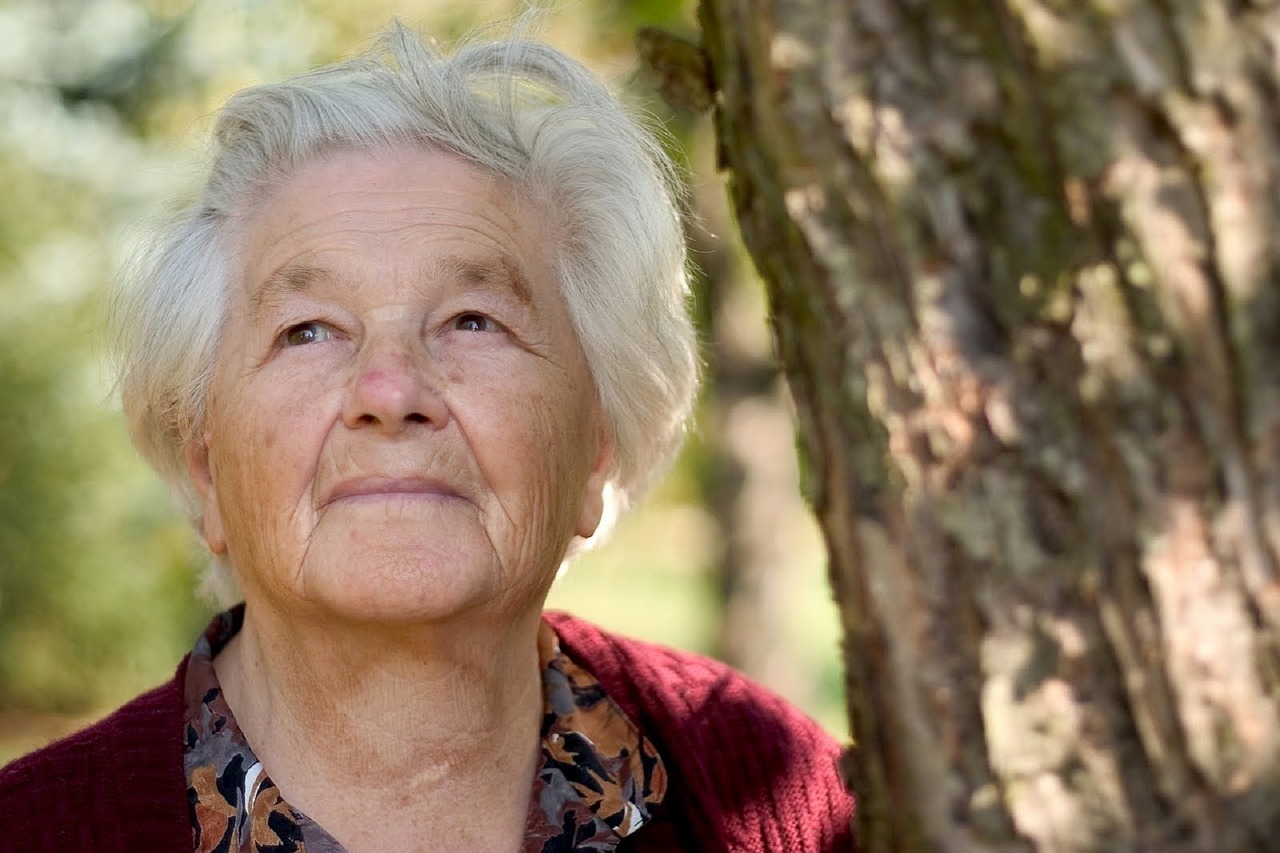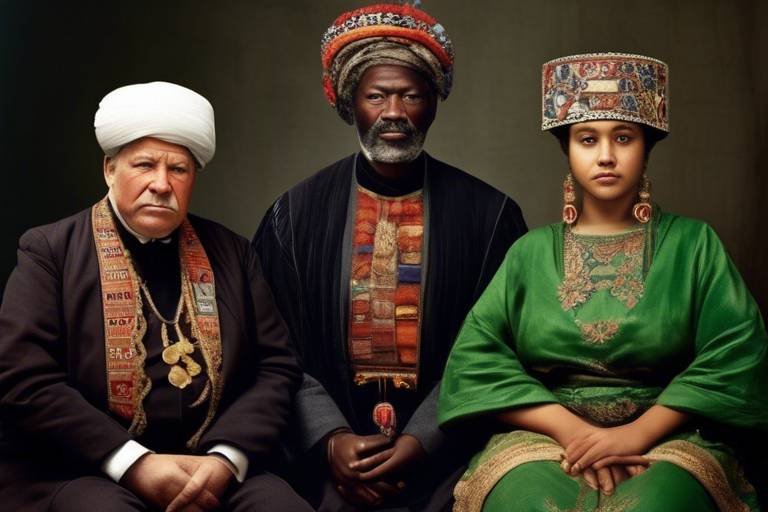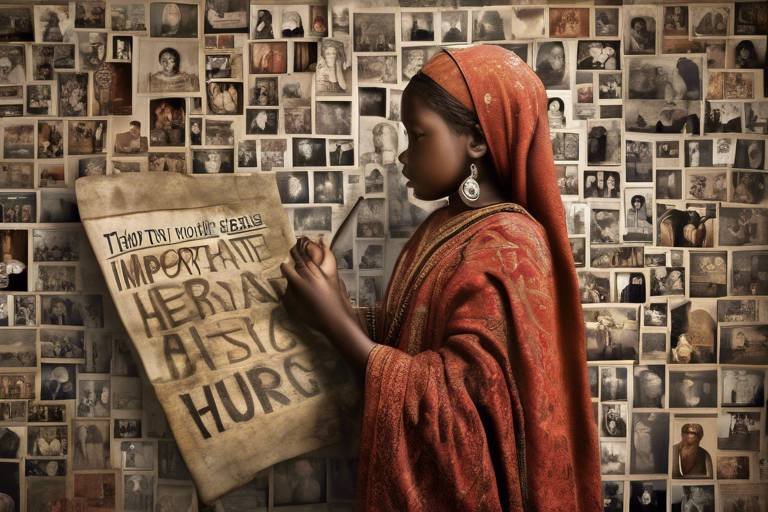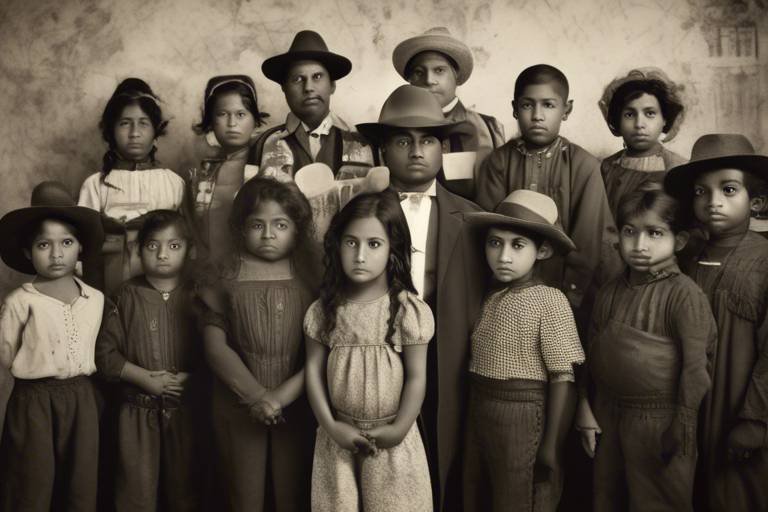The Contribution of Women to Historical Narratives
Women have played a crucial yet often overlooked role in shaping historical narratives throughout the ages. From ancient civilizations to modern history, women have made significant contributions that have influenced societies, cultures, and events in profound ways. Despite facing challenges and obstacles, their impact on shaping the course of history cannot be understated.

Women in Ancient Civilizations
Women in ancient civilizations played pivotal roles that are often overlooked in traditional historical narratives. In ancient societies like Egypt, Mesopotamia, and Greece, women's contributions were significant and multifaceted, challenging the commonly held belief that history is predominantly shaped by male figures. In Egypt, women held positions of power as queens and priestesses, exerting influence over politics, religion, and culture. Similarly, in Mesopotamia, women played vital roles in trade, agriculture, and even governance, showcasing their diverse capabilities beyond domestic roles. In Greece, women were involved in various aspects of society, from religious ceremonies to artistic endeavors, demonstrating their active participation in shaping the cultural landscape of the time.
Despite the prevailing focus on male achievements in ancient civilizations, women's impact was undeniable. They were not merely passive observers but active agents who influenced the course of history through their actions and decisions. By acknowledging and highlighting the roles of women in ancient societies, we gain a more comprehensive understanding of the past and recognize the richness and complexity of historical narratives beyond a male-centric perspective.

Women's Impact on Medieval Europe
During the medieval period in Europe, women made significant contributions that often go unnoticed in traditional historical narratives. While men dominated many aspects of society during this time, women played crucial roles in shaping the political, religious, and cultural landscape of medieval Europe. From noblewomen who wielded power and influence in courts to the everyday women who worked in fields and households, their impact was profound and multifaceted.
One notable aspect of women's influence in medieval Europe was their involvement in religious institutions. Women held positions of authority within convents and monasteries, where they not only practiced piety but also managed estates, engaged in intellectual pursuits, and provided education to other women. These religious spaces allowed women to exert power and influence beyond the confines of traditional gender roles.
Moreover, women in medieval Europe played essential roles in the realm of politics, often acting as regents for underage or absent rulers. Queens and noblewomen wielded significant political power, making strategic alliances through marriage, negotiating treaties, and overseeing the administration of territories. Their diplomatic skills and leadership abilities were instrumental in maintaining stability and prosperity in tumultuous times.
Additionally, women's impact on medieval European culture cannot be understated. They were patrons of the arts, supporting the work of artists, writers, and musicians. Women also participated in literary circles, producing works of poetry, prose, and religious texts that reflected their experiences and perspectives. Their contributions to the cultural flourishing of the period enriched society and left a lasting legacy.
Despite facing limitations and restrictions based on gender, women in medieval Europe found ways to assert their agency and leave a mark on history. By examining their roles and achievements, we gain a more nuanced understanding of the complexities of medieval society and the diverse contributions of both men and women to its development.

Women in the Age of Exploration
During the Age of Exploration, a time marked by daring voyages and discoveries that expanded the known world, women played significant but often overlooked roles. While history books often focus on male explorers like Columbus and Magellan, women also made their mark on this pivotal period. From providing financial support for expeditions to actively participating as explorers themselves, women contributed in various ways to the age of exploration.
One notable example is Queen Isabella of Spain, whose support enabled Christopher Columbus's famous journey to the Americas in 1492. While Isabella herself did not sail across the ocean, her decision to back Columbus's expedition had far-reaching consequences that reshaped world history. Isabella's influence highlights the behind-the-scenes roles women often played in exploration, exerting power and influence from the royal courts.
Moreover, women like Catalina de Erauso, known as the "Lieutenant Nun," defied societal norms by disguising herself as a man to explore the New World in the 17th century. Her extraordinary story challenges traditional gender roles and showcases the adventurous spirit of women during the age of exploration. Despite facing immense challenges and risking their reputations, these women navigated uncharted territories both literally and figuratively.
While male explorers often receive the spotlight, it is essential to recognize the unsung heroines who supported, funded, and even led expeditions during this transformative era. By acknowledging the diverse roles women played in the age of exploration, we gain a more nuanced understanding of history and appreciate the contributions of these trailblazing individuals.

Women's Contributions to Scientific Discoveries
Women have made significant contributions to scientific discoveries throughout history, often in the face of challenges and barriers. From ancient times to the modern era, women have played crucial roles in advancing various fields of science, yet their achievements have been overshadowed and underrepresented in historical accounts. Despite facing discrimination and limited opportunities, women have persevered and made groundbreaking discoveries that have shaped our understanding of the world.
One notable example of a pioneering woman in science is Marie Curie, a physicist and chemist who conducted groundbreaking research on radioactivity. Her discoveries not only earned her two Nobel Prizes but also laid the foundation for future advancements in nuclear physics and medicine. Curie's work not only contributed to scientific knowledge but also paved the way for other women to pursue careers in science.
Another trailblazing woman in the field of science is Rosalind Franklin, a chemist whose work was instrumental in the discovery of the structure of DNA. Despite not receiving due credit during her lifetime, Franklin's research was essential in unlocking the mysteries of genetics and molecular biology. Her contributions have since been recognized as fundamental to our understanding of the building blocks of life.
Women have also excelled in fields such as astronomy, mathematics, and biology, making significant discoveries and advancements that have shaped the course of scientific history. From Ada Lovelace, considered the world's first computer programmer, to Jane Goodall, renowned for her groundbreaking research on primates, women have left an indelible mark on the scientific community.
Despite their achievements, women in science have often faced discrimination, lack of recognition, and limited opportunities for advancement. The persistent gender gap in STEM fields continues to be a challenge, with women underrepresented in leadership roles and research positions. Addressing these barriers and promoting gender equality in science is crucial for fostering innovation and diversity in scientific research.
By highlighting the contributions of women to scientific discoveries and acknowledging their impact on shaping our understanding of the world, we can inspire future generations of female scientists and create a more inclusive and equitable scientific community. Recognizing and celebrating the achievements of women in science is not only a matter of historical accuracy but also a step towards building a more diverse and vibrant scientific landscape.

Women's Role in Social Movements
Women have played a pivotal role in various social movements throughout history, advocating for change, equality, and justice. From the suffrage movement fighting for women's right to vote to the civil rights movement advocating for racial equality, women have been at the forefront of driving societal transformation. Their activism and determination have sparked significant progress and paved the way for future generations to continue the fight for a more equitable world.
One notable example is the feminist movement, which has challenged traditional gender norms and fought for women's rights in areas such as education, employment, and reproductive rights. Women activists and leaders have organized protests, lobbied for policy changes, and raised awareness about issues affecting women globally. Their efforts have led to groundbreaking achievements, including the passing of legislation to protect women from discrimination and violence.
Women have also been instrumental in advocating for marginalized communities, amplifying the voices of those who have been historically silenced or oppressed. By standing in solidarity with other social movements, women have demonstrated the power of collective action and the importance of intersectionality in addressing systemic injustices. Their ability to build coalitions and bridge divides has been essential in creating lasting change and fostering a more inclusive society.
Despite facing challenges and resistance, women in social movements have persisted in their pursuit of justice and equality. They have shown resilience in the face of adversity, drawing strength from their shared experiences and common goals. By harnessing their collective power and amplifying their voices, women have been able to effect meaningful change and shape the course of history for the better.

Women Leaders in Modern History
Women have played pivotal roles as leaders in modern history, breaking barriers and reshaping societal norms. From political figures to activists and innovators, women have left an indelible mark on contemporary societies and global events. Their leadership styles and approaches have often brought unique perspectives to the table, challenging existing power structures and advocating for change.
One notable example is Angela Merkel, the first female Chancellor of Germany, who has been a prominent figure in European politics for over a decade. Merkel's leadership during challenging times, such as the European financial crisis and the refugee crisis, has earned her international acclaim and respect.
Another influential figure is Malala Yousafzai, a Pakistani activist for female education and the youngest Nobel Prize laureate. Despite facing adversity and a near-fatal attack by the Taliban, Malala has continued to advocate for girls' education worldwide, becoming a symbol of courage and resilience.
Michelle Obama, former First Lady of the United States, has also emerged as a prominent leader, championing causes such as education, healthy living, and women's rights. Her initiatives, such as the "Let's Move!" campaign and the "Let Girls Learn" program, have had a lasting impact on communities both in the U.S. and globally.
Moreover, Jacinda Ardern, the Prime Minister of New Zealand, has gained international attention for her compassionate and decisive leadership, particularly in the aftermath of the Christchurch mosque shootings. Ardern's handling of the crisis and her emphasis on unity and empathy have set her apart as a progressive and empathetic leader.
These women leaders have not only shattered glass ceilings but have also inspired future generations to pursue their aspirations and strive for positive change. Their stories serve as a testament to the transformative power of women's leadership in shaping a more equitable and inclusive world.

Challenges Faced by Women Historians
Exploring the often overlooked or marginalized roles of women in shaping historical events, societies, and cultures, and the importance of incorporating their perspectives into historical narratives for a more comprehensive understanding of the past.
Women historians have faced numerous challenges throughout history, struggling against biases and obstacles that have hindered their recognition and contributions to the field. One significant challenge is the issue of representation, where women's voices and perspectives have been historically marginalized or excluded from mainstream historical narratives. This lack of representation not only diminishes the diversity of historical accounts but also perpetuates a skewed view of the past that prioritizes male experiences and achievements.
Moreover, women historians often encounter difficulties in gaining recognition for their work, with their research and insights sometimes being dismissed or undervalued in academic and professional circles. This lack of acknowledgment can be demoralizing and discouraging, leading to a persistent underestimation of the impact and significance of women's historical scholarship.
Another challenge faced by women historians is the importance of amplifying their voices within a field that has traditionally been dominated by male perspectives. Breaking through the barriers of gender bias and discrimination requires a concerted effort to support and promote the work of women historians, ensuring that their contributions are acknowledged, respected, and integrated into the broader historical discourse.
To address these challenges, it is essential to create a more inclusive and equitable environment within the field of history, where women historians are given equal opportunities, recognition, and support to pursue their research and share their insights. By amplifying the voices of women historians and reevaluating historical narratives through a gendered lens, we can foster a more diverse, accurate, and enriched understanding of the past.
Stay tuned for our FAQ section coming soon!

Reimagining Historical Narratives Through a Gendered Lens
Reimagining historical narratives through a gendered lens offers a transformative perspective on the past, allowing us to uncover hidden stories and perspectives that have long been overlooked. By incorporating the experiences and contributions of women into historical accounts, we can paint a more nuanced and comprehensive picture of the events that have shaped our world.
Through this gendered lens, we can challenge traditional narratives that have centered primarily on male figures and their achievements. By highlighting the roles and impact of women in various historical periods, we can reshape our understanding of history and acknowledge the diverse voices that have influenced the course of human civilization.
By reexamining historical events from a gendered perspective, we can also uncover the challenges and obstacles that women have faced throughout history. From restrictions on education and employment opportunities to societal expectations and biases, understanding the experiences of women in the past can shed light on the struggles and triumphs that have shaped their lives.
Furthermore, viewing historical narratives through a gendered lens allows us to appreciate the contributions of women in different fields, including science, politics, art, and social movements. By recognizing the achievements of women who have often been marginalized or forgotten, we can celebrate their impact on society and acknowledge their lasting legacies.
Ultimately, reimagining historical narratives through a gendered lens is not only about correcting past omissions and biases but also about creating a more inclusive and accurate representation of the past. By incorporating diverse perspectives and amplifying the voices of women in history, we can enrich our understanding of the complexities and richness of human experience across time.
Frequently Asked Questions
- What is the significance of highlighting women's contributions to historical narratives?
By showcasing the often overlooked roles of women in history, we gain a more comprehensive understanding of past events, societies, and cultures. It allows for a more inclusive and accurate portrayal of historical events, challenging traditional narratives that predominantly focus on male figures.
- How did women in ancient civilizations impact society?
Women in ancient civilizations like Egypt, Mesopotamia, and Greece played significant roles in various aspects of society, including politics, religion, and culture. Their influence challenged societal norms and contributed to shaping the course of history.
- What obstacles do women historians face in the field?
Women historians often encounter biases, lack of representation, and difficulties in gaining recognition for their work. It is crucial to support and amplify their voices to ensure a more balanced and diverse historical narrative.
- Why is it important to reimagine historical narratives through a gendered lens?
Reimagining historical narratives through a gendered lens allows for a more inclusive and accurate representation of the past. It helps in highlighting the diverse contributions of women and provides a more holistic view of historical events and their impact.



















